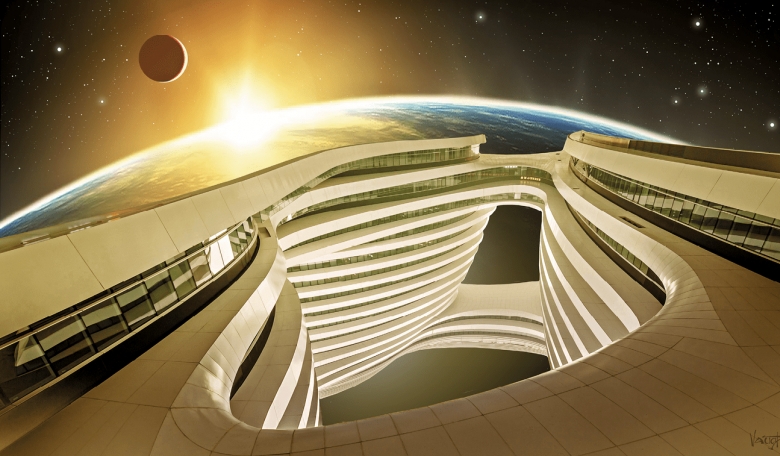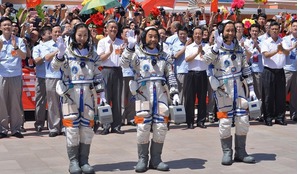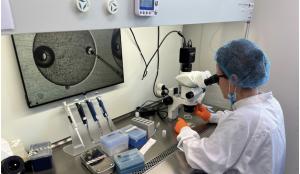Despite the challenges of a global virus pandemic, the world’s first ‘digital democracy’ has continued to function with comparatively little disruption. Asgardia’s Chair of Parliament, Lembit Öpik, reports on a period of sustained productivity for Asgardia’s Parliament. The next giant leap forward, says Mr Öpik, will be to ignite a digital Asgardian economy that is robust during times of terrestrial instability and crisis.
Every successful venture is born of dreams. And every dream matures and develops as it faces the realities of turning ideas into action. That’s why this year Asgardia’s Parliament arrived at the point where the real heavy lifting began. After the initial euphoria of establishing the core structures of the world’s newest national entity, we now face the very real task of putting the fledgling nation into action and building a successful economy.
No goal is more vital to Asgardia than generating the funds needed to build the hardware for permanent human space habitation. All Asgardian Members of Parliament share this ambition. The question is: how can we best create a financial turnover comparable to those of the world’s larger nations to pay for our ambitions?
Politically speaking, Asgardia is already a proven success story. The Parliament has a level of professionalism that doesn’t just happen - it is earned through good faith and some trial and error. We’ve reached a point where legislation is being debated, modified and passed according to procedures that work - and also in line with a mindset that reveals an appreciation of what everyone is actually doing there.
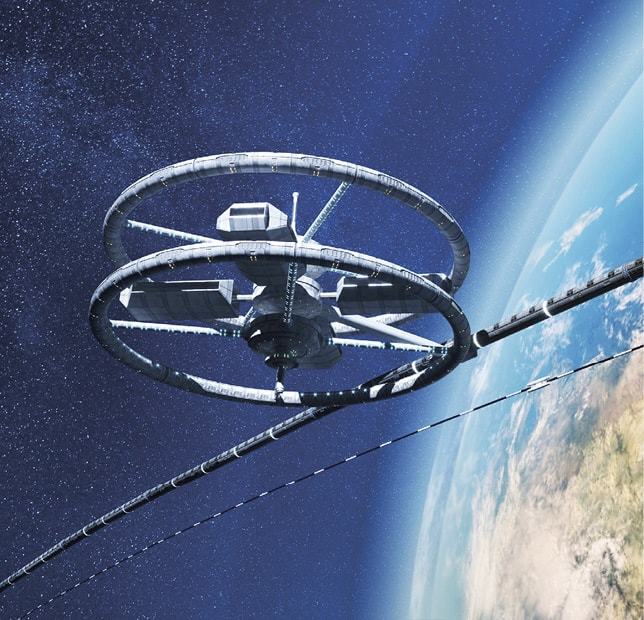 Space offers new opportunities for science and industry located in Earth orbit. One such idea was captured by Dr Anatoli Yunitski, a finalist in Asgardia’s 2019 space art competition. Dr Yunitski is President of the Skyway Group of companies based in Minsk, Belarus.
Space offers new opportunities for science and industry located in Earth orbit. One such idea was captured by Dr Anatoli Yunitski, a finalist in Asgardia’s 2019 space art competition. Dr Yunitski is President of the Skyway Group of companies based in Minsk, Belarus.
Our most recent Digital Parliamentary Sitting moved forward with judiciary rules, citizenship legislation and the framework for Asgardia’s currency and bank. These are all vital components for the development of civil society, financial stability and an economy that has to return a surplus large enough to pay for our journey towards living in space.
We’re here to make sure humanity doesn’t waste time, energy and lives in conflict with itself - or with anyone else
Creating a space nation is not about launching loads of rockets and having wacky adventures while getting lost in space. Proper space nation building is a less sensationalist and more structured. Star Trek’s Captain Kirk could easily get restless sitting in a parliamentary session instead of going where no man has gone before; and I expect Darth Vader would dismiss democratic decision-making as no match for the power of the Dark Side of the Force. But Asgardia is not a sequel to a space-based motion picture, and certainly doesn’t want to spend all its time fighting the somewhat authoritarian ethos or collectivism of the Borg, or the Empire. In fact, we’re here to make sure humanity doesn’t waste time, energy and lives in conflict with itself - or with anyone else. Asgardia is here to ensure that humanity can survive peacefully in space for the long haul.
If we’re going to avoid all that trouble and strife, we’ve got to build our nation in a very methodical way - taking our time, thinking it through and being careful to avoid avoidable errors. Any mistakes made now will grow with the nation. Better to take a calm and thoughtful approach today, and save a whole lot of trouble tomorrow.
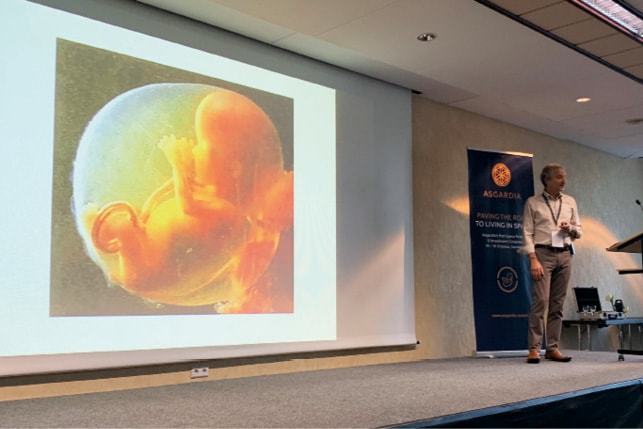 Prof Jeffrey Alberts, of Indiana University in the USA, presenting Life Cycles in Space: Considerations on Leaving ‘Cradle Earth’ at the Asgardia Space Science & Investment Congress in October 2019. One of Asgardia’s primary goals is to facilitate the first safe birth of a human in space.
Prof Jeffrey Alberts, of Indiana University in the USA, presenting Life Cycles in Space: Considerations on Leaving ‘Cradle Earth’ at the Asgardia Space Science & Investment Congress in October 2019. One of Asgardia’s primary goals is to facilitate the first safe birth of a human in space.
Lockdown
How well has Asgardia’s Parliament worked under the Covid-19 ‘lockdown’ that has affected so many human communities? It has, in fact, been a good test for our nation. When we are in space, there will be no possibility of everyone commuting to a central location to have our meetings. So, planet Earth is our ‘beta test’ for a digital community. For two years, I’ve chaired weekly, informal, Parliamentary meetings, usually on a Thursday. These work exceptionally well. I’ve watched with interest as other businesses – and political systems – have struggled to learn how to hold digital meetings during the Covid-19 outbreak: remote working is already second nature to any Asgardian parliamentarian.
Sometimes travel is necessary. Perhaps in the future the technology will be good enough to make virtual meetings as good as physical ones but, for now, humans have to meet physically every now and then. However, the majority of those involved in politics, society and commerce will be able to function most of the time using the digital platforms available. The only long-term issue will be when Asgardia, and therefore humanity, is spread so far and wide across the solar system that communication delays arise from the limiting factor of light speed. Even regarding this, we’re considering how debates could be held to embrace that law of physics.
Tangible goals
Practically speaking, where is Asgardia in terms of its readiness to run a space democracy? Firstly, it’s clear Parliament is aligned to the central mission of securing the first space birth of a human. This is key, because unless our species can reproduce in space, we can’t go far from Earth’s hospitals. We simply must be able to perpetuate the species without constant visits back to Earth. Consider also the perils of re-entry - at least with current technology - for a pregnant mother. No doctor would recommend inflicting those g-forces on an unborn child. So this is a central theme of our scientific and logistical discussions.
No goal is more vital to Asgardia than generating the funds needed to build the hardware for permanent human space habitation
Tied into this, of course, is the goal of permanent space habitation. The International Space Station is an impressive achievement - but it’s not a permanent home to anyone. You go, you stay, you leave. Asgardia’s aim is that space will be a place you live in, not just visit. Politically speaking, Parliament is heavily engaged with putting together the terms of reference to make all that possible.
Our Science Committee, headed up by the able and far-sighted Luca Sorriso-Valvo, has been closely involved with this research. It’s still early days, but we’ve made more progress than any other community in terms of space habitation and space birth. I know this goal is a top priority for Head of Nation, Igor Ashurbeyli, and his commitment to these objectives is a great boost to our initiatives.
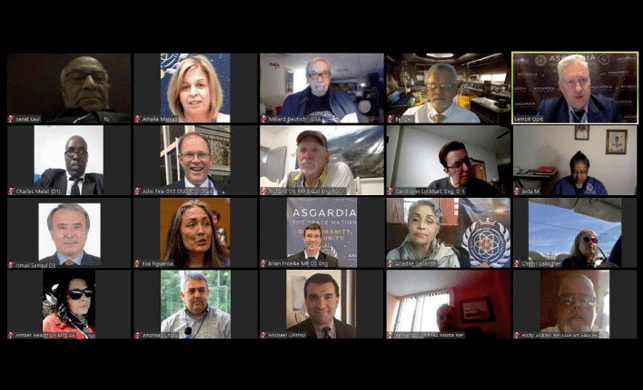 Remote working across the globe was already second nature to any Asgardian parliamentarian, long before the recent rise in popularity of platforms like Zoom during the coronavirus pandemic.
Remote working across the globe was already second nature to any Asgardian parliamentarian, long before the recent rise in popularity of platforms like Zoom during the coronavirus pandemic.
To make permanent space habitation a tangible goal, we’re putting in place the legal structures that need to go with it. We’re defining what constitutes a legal offence, what the penalties are and what an Asgardian citizen’s rights are too. By the time you’re on the launch pad, it’s too late to work all that out. We need to get it all sorted before the final countdown begins.
Economic reality
All this brings me back to the recurring theme of getting the economy going. We have to generate the funds to build or buy the spacecraft we need to make the vision a reality. This is an ever-present need, and it keeps me up at night. I know the human race is inspired enough to invest in our future: it’s just a matter of working out how we do this as quickly and effectively as possible. This is about ensuring Asgardia is the centre point for public investment in a shared goal, without the need for superpower interference, or a Cold War to drive space investments. Let’s not pretend: history tells us that if national pride between Earth countries drives space habitation, there is little or no prospect of democracy in space - or of peace in orbit, either. As far as creating a space nation for all humankind is concerned – one that has no intention whatsoever of using its orbital status for terrestrial advantage – Asgardia is the only game in town.
Another part of the work I’m engaged in right now is re-establishing the Government pillar of Asgardia’s political structure. Earlier this year, it became clear from the way Asgardia’s political system has evolved, that we needed to slightly rethink how Parliament and Government work together. The benefit of experience showed us that we weren’t making the most of that relationship and there wasn’t sufficient synergy between the two groups. The Prime Minister, Ana Mercedes Diaz, and her Ministers, stood down to enable a revision to the relationship. Incidentally, Ana continues as a key advisor to Dr Ashurbeyli, so nothing has been lost in terms of her energy or expertise.
The Covid-19 outbreak has had some impact on the speed with which we have been able to commence re-forming the Government. As I said before, there is some need for physical human contact in certain situations, and I think this kind of ‘recruitment’ activity is a good case in point. At time of writing, there is still a lot of uncertainty about how the Coronavirus pandemic will play out and we will have to move forward working within the context of any related restrictions. The aim is still to get the whole of the new Government, including the Prime Minister, in place during this calendar year.
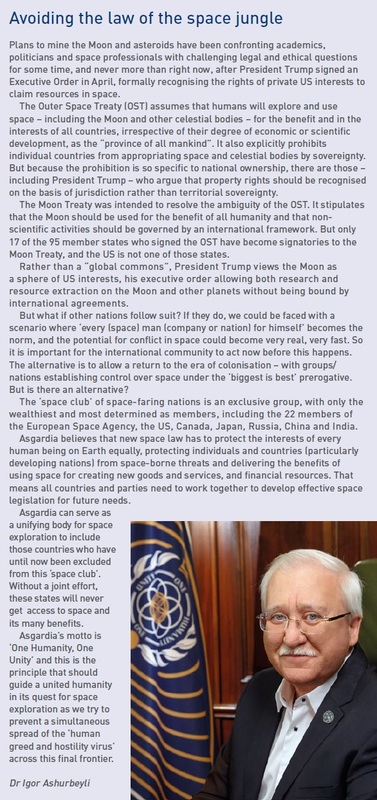
We’re also holding a by-election to ‘top up’ the Parliament itself. I’m determined to ensure that all 150 Parliamentary seats are filled - and this is something we can do digitally - just like the last election for Parliament, which was carried out flawlessly using a digital electoral system. If you’re between 40 and 80 years old, and if you have at least a degree level qualification, you may wish to apply as a candidate. The timing for the election will be from July to October this year.
Asgardians have the will to go into space, and to stay there. And where there’s a will, there’s always a way
Not being able to travel has been a little limiting for me personally. As Chair of Parliament, I do find that not being able to hold some meetings face-to-face has been a bit troublesome. So I hope that by the time you read this, the airways will have started to open up again. Apart from that, it’s steady progress for Asgardia and its Parliament. In addition to the establishment of the new Government and the Parliamentary by-election, we have the next physical sitting of Asgardian Members of Parliament to look forward to – and that’s one event which really does depend on terrestrial factors outside Asgardia’s control.
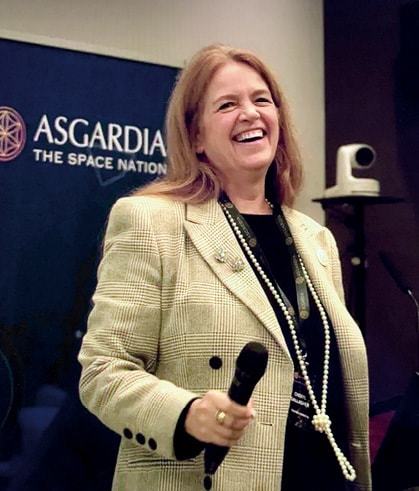 Cheryl Gallagher, an MP for Asgardia’s District 13 and Chair of the Culture Committee.
Cheryl Gallagher, an MP for Asgardia’s District 13 and Chair of the Culture Committee.
Working with Dr Ashurbeyli continues to be an inspiration and an honour. I’ve never known anyone who’s so clear headed and determined to achieve what the human race must achieve - a democratic space community that defaults to stability under stress. Together with the Committee Chairs, the Asgardian ‘civil service’, and the steady, calm and honest teamwork between the Deputy Chair of Parliament, Ben Dell, and myself, I’d say we’re making good advances - from informal meetings on policy through to a successful Space Art Competition which was the inspiration of our Chair of Culture Committee, Cheryl Gallagher.
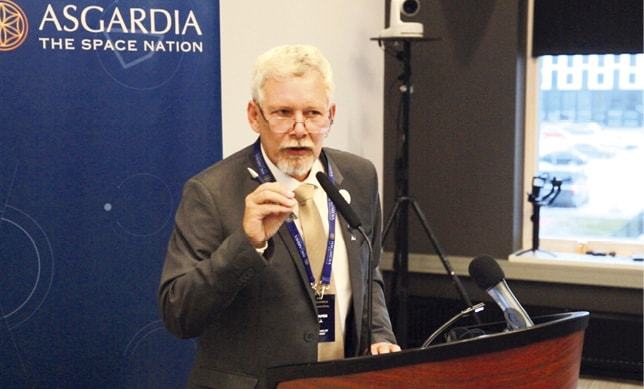 Benjamin Dell, chair of the Foreign Affairs committee, which has the remit to examine the expenditure, administration and policy of the Foreign Office.
Benjamin Dell, chair of the Foreign Affairs committee, which has the remit to examine the expenditure, administration and policy of the Foreign Office.
Covid-19 briefly shut down a lot of human interaction. But it didn’t shut down Asgardia. Our nation was tested by the same circumstances as everyone else, and passed that test. We now need to pass two more tests that we’ve set ourselves - a massive increase in residents, and ‘lift-off’ for our economy. Those are big challenges. But going to the Moon was harder - and the United States did that in under a decade. More than any other nation in history, Asgardians have the will to go into space, and to stay there. And where there’s a will, there’s always a way.
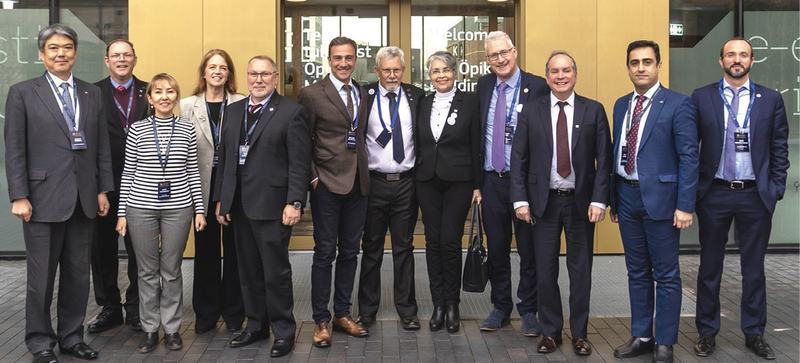 The committee chairs of Asgardia’s parliament.
The committee chairs of Asgardia’s parliament.





